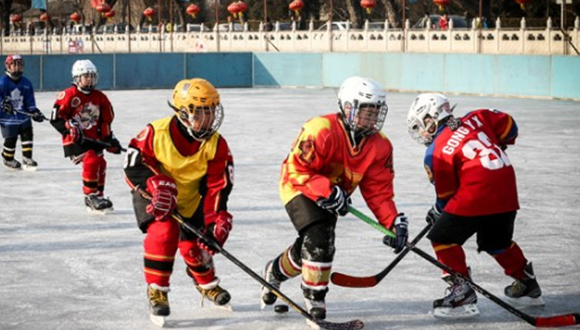Ice hockey remains a niche sport at the elite level in China despite public enthusiasm for Beijing's bid to host the 2022 Winter Olympics, but increasing youth participation bodes well for the future, according to insiders.
However, they say progress is unlikely to be fast. Hopes that the Chinese women's team will take part in the 2018 Pyeongchang Winter Olympics have suffered a blow as the team finished third at the World Championship Division I Group B tournament in Beijing last month.
This meant the women failed to win promotion to the higher-level Group A, and this will make it harder for them to qualify for the 2018 Winter Games.
The dearth of up-and-coming talent was shown by the fact that veteran Sun Rui was recalled as captain after a two-year retirement to take part in the competition, staged by the International Ice Hockey Federation.
She was embarrassed by the fact that, at 33, she remains the country's best player long after her prime.
Nevertheless, the excited screams and cheers from supporters made her feel optimistic about the future of the sport.
"I was gratified that such a big audience was here to cheer up for us," said Sun. "I could see hope for the sport in China. We are not alone."
Four of Sun's national teammates from the early 2000s who had also retired were persuaded to come back for the tournament due to the lack of current talent.
"It was a challenge both physically and mentally, but I couldn't sit back and watch my beloved sport struggle because of the thin talent pool for the national team," Sun said.
The current situation is a far cry from the success that ice hockey enjoyed in the 1990s, when more than 10 provincial sides from Northwest and Northeast China competed against each other regularly. The teams were fully funded by local sports bureaus.
The surge culminated at the 1998 Nagano Winter Olympics, where the women's national side finished fourth, a level of achievement rarely accomplished by China in team events at the Olympics.
Gold medal obsession
Driven by the gold medal obsession in the country's State-run sports system, local sports bureaus started to cut investment in big-spending winter events such as ice hockey in the 2000s. The funds and resources were reallocated to individual sports including figure skating and speedskating.
"It takes a long time and a lot of money to cultivate a group of talents to produce elite results in ice hockey," said Tong Lixin, deputy director of the State Winter Sports Administrative Center. "A lot of local sports officials didn't bother investing time and money in it as they wanted to see instant results in the four-year Olympics cycle."
According to the center, fewer than 300 players are registered with two teams in Harbin and Qiqihar in Heilongjiang province and train full-time under the State-run umbrella. The total includes both men and women.
Jia Dandan, the coach of the female youth team in Harbin, said the recruitment of youngsters to the two teams has been hampered by the lack of a professional league along the lines of the National Hockey League in North America, the limited allowances paid and the uncertain career prospects of a full-time ice hockey player.
"Nowadays, you can't just ask the younger generation to remain committed to a demanding sport just for the sake of their love of it without providing decent earnings," said Jia, Sun's former national teammate.
Jia's 20 players take part in three 90-minute training sessions every day, starting as early as 6 am, and are each paid just 2,000 yuan ($322) a month. They have to use old equipment passed on from the adult team.
Youth participation rises
In contrast to the sport's decline in its traditional home in the Northeast, its huge popularity among the children of well-off families in Beijing has become a phenomenon.
At the women's championship held at Beijing's Capital Indoor Gymnasium, a group of more than 100 children in full ice hockey outfits stole the limelight with their loud chants for the host team.
"I like playing ice hockey because it is fun and it looks so cool," 10-year-old Wen Bocheng said at China's final game against Slovakia.
Despite fatigue and the occasional bruise, Wen joins more than 20 other youngsters from Tsinghua University Primary School three times a week to train at the Dreamport Mall in north Beijing, and he also plays a full-contact game each week.
Wen Quan, his father, said, "In the beginning, we were kind of worried about the frequent body checks, but watching him working hard at something he loves at a young age, learning discipline and teamwork, there's really nothing you can do but support him."
Wen Bocheng and his hardworking schoolmates are among 2,000 children from 96 junior club teams registered with the Beijing Ice Hockey Association's Minor Hockey Premier League. They play through the winter and spring.
Thanks to Beijing's 2022 bid, more commercial rinks suitable for ice hockey training have opened to the public at affordable prices, while a growing number of families have adopted the sport.
"Given that students lack outdoor exercise in winter and are under intense pressure academically, it's a great boost to physical education on campus," said Huang Kan, commissioner of the Beijing Municipal Education Commission. "Playing team sports such as hockey will help build character and improve the students' physical health."
This new generation of ice hockey juniors supported by families rather than the State system is likely to make a difference in the near future, Sun Rui said.
"We would love to see more young players developing outside the State system. With so many families involved in the sport, we can expect a bright future," she said.
Thomas Wu, vice-president of the IIHF, has also taken notice of the sport's growing profile in the capital.
"I think in Beijing there is a decent level of competition both locally and for youngsters who go overseas to play," Wu said.
